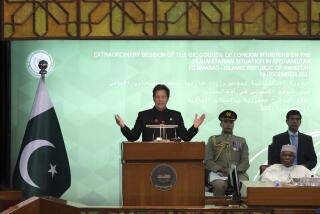Afghan president unlikely to form Cabinet before key international aid conference
- Share via
Reporting from Kabul, Afghanistan — The Afghan parliament’s decision today to recess for several weeks made it unlikely that President Hamid Karzai would be able to meet Washington’s desire to have a complete government in place ahead of a crucial international aid conference in London at the end of the month.
More than 60 countries will send delegations to that conference, where nations are expected to pledge billions of dollars in economic and security aid to bolster the government of the Afghan leader, now in his second five-year term. But Washington and its allies want Karzai’s Cabinet in place so that donor nations know which ministers will be responsible for handling the aid. One of the international community’s biggest concerns about Karzai’s administration has been its inability to safeguard incoming financial support from rampant corruption.
In votes in early January and on Saturday, Afghan lawmakers rejected a majority of the Cabinet nominees Karzai presented. The votes have left the Afghan leader with 11 of the 25 Cabinet posts unfilled. Today, Karzai’s spokesman said it was doubtful the Cabinet lineup could be completed in time for the Jan. 28 conference.
“As far as the completion of the Cabinet before the London conference is concerned, our understanding is that we may not be able to do so, and that the parliament might go to its recess,” Karzai’s spokesman, Waheed Omar, said at a news conference in Kabul. “We will introduce new members after they come back from their recess.”
At the conference in London, one of the most crucial issues on the agenda will be Afghanistan’s effort to bring Taliban militants, particularly lower-tier fighters, back into Afghan society through a variety of incentives, including jobs and vocational training. Karzai, who has yet to unveil the specifics of that plan, has been roundly criticized for a previous Taliban reintegration effort widely regarded as a badly conceived, failed program. Former Taliban fighters who surrendered later complained they never received the money or land they were promised in exchange for their renunciation of the militancy.
Western governments have been helping the Karzai administration craft a reintegration program that will work. At a forum in Kabul today, Richard Holbrooke, President Obama’s special representative to Afghanistan and Pakistan, said the U.S. backs the program being developed.
“The majority of the people fighting with the Taliban are not supporters” of Taliban leader Mullah Mohammed Omar, the Associated Press quoted Holbrooke as saying. “They’re not supporters of the ideology of Al Qaeda. They don’t even know who Al Qaeda is and yet they fight because they’ve been misled by false information.”
Karzai’s spokesman would not discuss details of the government’s new reintegration plan, saying only that “we are learning from the past to try to come up with the proper program that will allow [former Taliban fighters] to start a normal life in Afghanistan.”
Meanwhile, the North Atlantic Treaty Organization announced it was investigating two incidents today in which Afghan civilians were killed when international troops fired upon vehicles speeding toward them.
In the northern province of Kunduz, a vehicle pulled out of a line of cars at a checkpoint and sped forward. When the driver ignored hand signals and warning shots, troops opened fire. One passenger was killed and two people were injured.
The other incident occurred early this morning in Garmsir district in the volatile southern province of Helmand, where a vehicle with six people inside sped toward NATO troops with its headlights off. The soldiers fired at least three shots into the grille of the vehicle. An Afghan man in the car was shot in the chest and transported to Forward Operating Base Dwyer, where he died of his wounds.
Special correspondent M. Karim Faiez contributed to this report.
More to Read
Sign up for Essential California
The most important California stories and recommendations in your inbox every morning.
You may occasionally receive promotional content from the Los Angeles Times.












